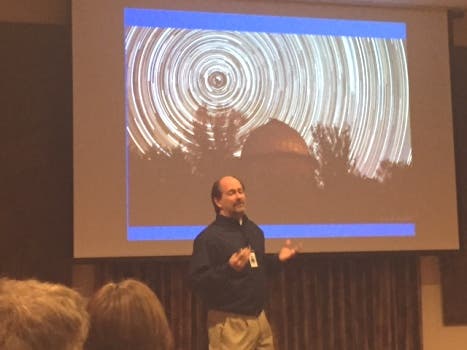'Astronomer' Doesn't Begin to Cover Copernicus
Karl Galle would prefer that scholars don’t refer to Nicolaus Copernicus simply as a “16th Century astronomer.” In what began as a sidebar of a few pages in Galle’s dissertation, has led to a six-month research stint at the Linda Hall Library to examine the life and work of Copernicus. Galle’s research will be the subject of his April 28 Fellows Lecture at 3:00 p.m. in the Linda Hall Library Auditorium. “What Copernicus discovered was not just a big thing in astronomy, but it was a big thing in determining our place in the universe,” Galle said. “However, the idea wasn’t debated very much until 70 to 100 years after his death. I want to focus on who he was and what he did during his life.” Copernicus’s astronomical discovery is his lasting legacy, but it was nearly impossible to make a living in astronomy at that time. Copernicus used his science and mathematics skills to support the major institution of the time: the church-state. Galle’s Fellows lecture title “The Unknown Copernicus: Spies, Printers, Amazons, and Body Snatchers in an Age of Astronomical Revolution,” hints at more than a little palace intrigue was part of Copernicus’s life. “Most of the things in the title were done to Copernicus, not done by him,” Galle said. For example, Galle found correspondence from a spy who repeatedly broke into Copernicus’s apartment in an unsuccessful search for a map Copernicus was drawing up to identify territorial boundaries. Galle, whose background includes teaching at the American University in Cairo, Egypt, and working for the U.S. State Department, said the opportunity to do in-depth research at the Linda Hall Library has been a positive and fruitful experience. He praised both the Library’s rare book collection and other volumes in the open and closed stacks. “It allowed me to pull out additional materials to compare things that were going on during the same time period,” Galle said. “I was able to take a broader view of Copernicus and delve into the issues he was facing.” Galle plans to develop a book proposal by the end of the year. In addition to his Fellows lecture, Galle shared his research last weekend at the Midwest Junto in Norman, Okla., and will present his research in Lisbon, Portugal, in June. “Of course, a lot has been written about Copernicus, and we understand his work in astronomy pretty fully,” Galle said. “I don’t think that’s true of his professional life.”






